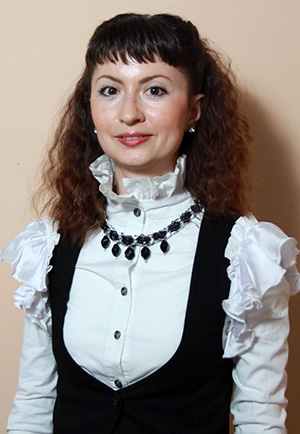|
  UDC 330.341.1(477); JEL О31, О32
UDC 330.341.1(477); JEL О31, О32
Yurynets, Z., Kruhlyakova, V., & Myshchyshyn, I. (2018). Stratehichni pidkhody do rozvytku sub’yektiv hospodaryuvannya na osnovi aktyvizatsiyi vykorystannya yikh innovatsiynoho potentsialu [Strategic approaches to the development of business entities on the basis of increased use of their innovative potential]. In Sotsial'no-ekonomichni problemy suchasnoho periodu Ukrayiny [Socio-Economic Problems of the Modern Period of Ukraine]: Vol. 131 (3) (pp. 121-125). Retrieved from http://ird.gov.ua/sep/doi/sep2018.03.125. [in Ukrainian].
Sources: 6
Authors
Yurynets Zoryna VolodymyrivnaDoctor of Economics, Associate Professor
Professor of the Department of management of the Faculty of Economics of the Ivan Franko National University of Lviv
Contacts:  zoryna_yur@ukr.net zoryna_yur@ukr.net
Webpages:    

Kruhlyakova Vira VolodymyrivnaPh.D. of Economics
Associate Professor of the Department of state and local finances of the Faculty of Finance Management and Business of the Ivan Franko National University of Lviv
Contacts:  vira.krugliakova@gmail.com, vira.krugliakova@gmail.com,  vira.kruhlyakova@lnu.edu.ua vira.kruhlyakova@lnu.edu.ua
Webpages:  

Myshchyshyn Ivanna RomanivnaJunior Researcher of the Department of regional ecological policy and environmental management of the Dolishniy Institute of Regional Research of NAS of Ukraine
Contacts:  ivanna.myshchyshyn@gmail.com ivanna.myshchyshyn@gmail.com
Webpages:   
ResumeIn the article, the scientific and methodological provisions for the formation of matrix of innovation potential and motivation regarding the reacting to a competitive situation that allows entities to implement their choice of development strategy have been proposed. An own interpretation of the concepts of “innovative potential” and “motivation of economic entities regarding the reacting to a competitive situation” has been highlighted. This matrix is formed on the basis of computing of the integral indicator of the innovative potential of economic entities and the integrated index of motivation regarding the reacting to a competitive situation. The matrix consists of four segments and represents such development strategies of economic entity during creation of innovations as active (adoption / development of innovations, active operation at the market), active-passive (active operation at the market or implementation of innovation, change in its scale), passive-active (focusing on the creation and implementation of innovation or ignoring innovation), and passive (low motivation to innovation, slow growth of innovation potential, long time of innovations introduction). In the article, the methodology for calculating the integral indicator of innovation potential for economic entities has been presented. It includes such components as economic, organizational-technical, financial-investment and management components. It also reflects the methodology for calculating the integral index of motivation regarding the reacting to a competitive situation. It includes such components as the growth rate of implemented innovative products, the threat that innovation activity represents to a traditional type of activity, the level of interconnection between the innovation and the existing type of activity and the coefficient of competitors’ reaction as a result of the introduction of innovation. Recommendations to economic entities regarding their behavior in case of choosing the appropriate development strategy have been presented. The use of the offered matrix will give an opportunity to improve quality of administrative decisions and efficiency of innovative potential management by the economic entities in the process of innovative management.
Keywords:matrix, strategy of development, integral index, innovative potential, competition situation, motivation, innovative activity
References- Yurynets, Z. V., & Kruhlyakova, V. V. (2016). Neyromerezheve modelyuvannya yak instrument prohnozuvannya innovatsiynoho rozvytku ekonomiky Ukrayiny [Neural network modeling as a forecasting tool for innovative development of Ukraine’s economy]. Aktual’ni problemy ekonomiky – Actual Problems of Economics, 6, 425-432. [in Ukrainian].
- Pekhnyk, A. (2013). Ekspansiya TNK u suchasniy svitoviy ekonomitsi: teoretychni aspekty [Expansion of transnational corporations in contemporary world economy: theoretical aspects]. In Visnyk L’vivs’koho universytetu: Seriya mizhnarodni vidnosyny [Bulletin of the Lviv University: International Relations Series]: Vol. 33 (pp. 210-218). [in Ukrainian].
- Yurynets, Z. V., & Kruhlyakova, V. V. (2016). Otsinyuvannya innovatsiynoho potentsialu sub»yektiv hospodaryuvannya kharchovoyi promyslovosti [Evaluation of innovative potential of food industry enterprises]. Ekonomika ta suspil'stvo – Economics and Society, 7, 546-550. [in Ukrainian].
- Markides, K. (2010). Novaya model' biznesa: Strategii bezboleznennykh innovatsiy [The new business model: painless innovation strategies]. Moscow: Alpina. [in Russian].
- Yurynets, Z. V., Kruhlyakova, V. V., & Yurynets, R. V. (2017). Osoblyvosti motyvuvannya innovatsiynoyi diyal’nosti sub»yektiv hospodaryuvannya [Peculiarities of motivation of innovation activity of business entities]. Visnyk Khmel’nyts’koho natsional’noho universytetu: Ekonomichni nauky – Bulletin of the Khmelnytsky National University: Economics, Vol. 1, 122-125. [in Ukrainian].
- Popovych, P. Ya. (2001). Ekonomichnyy analiz diyal’nosti sub”yektiv hospodaryuvannya [Economic analysis of business entities activities] (Textbook). Ternopil: Economic Thought. [in Ukrainian].
|